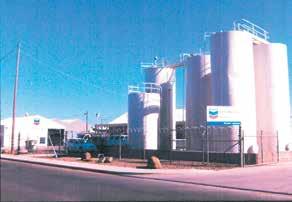
5 minute read
Sweet Potato Joe from page 1
from March 2023
continued from page 1 the former Florence Cardoza of Merced in 1942. from environmental groups for another decision last month, when they petitioned the State Water Board to temporarily waive water-quality rules in the Sacramento-San Joaquin River Delta in an effort to store more water in reservoirs. The board ended that waiver on Thursday, saying the latest rains and snow make it no longer necessary. known as the “Voice of Livingston.” From 1946 to 1996, he announced all the Livingston High School football games, lending his strong voice to the community by also announcing everything in Livingston from parades to radio programs. He served on the Livingston Elementary School Board and the Merced County Recreation Commission for many years. Joe’s acting skills even benefited the Livingston Little Theater Group, where he starred in several productions, most notably as Elwood P. Dowd in “Harvey”. can allow for eventual cutbacks in wellwater use to be somewhat less severe than the reductions would otherwise need to be. flows above that level.
Some floodwaters will also pour into wildlife refuges, among them the San Luis National Wildlife Refuge, Mendota Wildlife Area and Los Banos Wildlife Area.
Advertisement
The State Water Board said in its order that the changes allow for capturing “high flows that would otherwise go unused,” easing pressures on flood-control infrastructure and helping to address chronic declines in groundwater levels.
Environmental groups including the Natural Resources Defense Council and the Bay Institute objected to the plan, saying in a letter that the water diversions would allow for lower flows in the San Joaquin River than called for under a 2006 legal settlement, and would likely be harmful for Chinook salmon.
After the war, and during his life as a sweet potato farmer, he served as President of the California Sweet Potato Council, and US Sweet Potato Council, where he was a Director for over 20 years. He was the first California farmer to attend the National Sweet Potato Convention, among other industry firsts. Joe served as President of the Merced County Farm Bureau, and was on the Board of Directors of the Nisei Farmers League. He formed the California Sweet Potato Growers Co-op in Livingston, along with several other local growers, which is celebrating its 50th anniversary this year.
Newsom set a goal last year, as part of his water supply plan, to increase average annual groundwater recharge by about 500,000 acre-feet. The State Water Board said that since December it has signed off on diverting about 790,000 acre-feet of water for groundwater replenishment as well as supplies for wildlife refuges.
Most of the water pumped from wells in the Central Valley supplies farms that produce a wide variety of crops, from almonds to tangerines.

“While the order does not completely dry up the San Joaquin River, it will divert most of the water that was supposed to flow down the river under the court-approved settlement agreement, primarily to benefit corporate agribusinesses in
His interests and community involvement were very diversefrom serving as a founding member of the Livingston Medical Group, to past-President of Livingston Rotary, to being
Scientists found in a recent study that the depletion of groundwater in the valley has accelerated in recent years. They estimated that groundwater losses since 2003 have totaled about 36 million acre-feet, or about 1.3 times the full water-storing capacity of Lake Mead, the country’s largest reservoir.
His love of baseball began at an early age and became a life-long interest that manifested itself into a devotion to the sport for over eighty years. He organized the first kid’s hardball team in Merced County in the early 50’s. He was particularly fond of American Legion Baseball, serving as a coach, sponsor, announcer
As state officials have increasingly prioritized aquifer recharge, they have pointed out that there is vast storage space available underground, and that replenishing groundwater is one of the simplest and most economical ways to take advantage of wet years.
Local water agencies have started to plan recharge projects as they begin to implement plans to curb excessive pumping, as required under the state’s 2014 Sustainable Groundwater Management Act.
There has also been a growing focus among water management officials on finding ways to ease the permit process to use storm water for aquifer recharge, and to invest strategically in infrastructure to move water to areas where permeable soils make for fast paths to the groundwater.
The State Water Board said the single request from the federal government cleared the way for large-scale recharge without the need for approving numerous smaller permits.
Ekdahl said. “The amount of water that will be rediverted here is still relatively low compared to how much water will be flowing in the system.”
The Newsom administration and the federal government drew criticism
The water that’s used to replenish the aquifer will help local agencies move toward goals of addressing overpumping under the groundwater law, said Thomas Harter, a professor of water resources at UC Davis.
Harter said 600,000 acre-feet is “a significant chunk, and it’s certainly an important stepping stone toward future wet years and getting to these goals.” He said the water stored underground and booster for over fifty years. This led to his being appointed the third Area Commissioner of Baseball. All of these years of being involved in baseball in Livingston culminated in the community baseball field being renamed the “Joe F. Alvernaz Baseball Field,” something he was so proud of.
“To the degree we can increase the supply, and we can only do that by capturing these large flood flows and storing them, that’s our main card in this game,” Harter said. “It’s not going to take away the need to reduce the demand, but it will lessen the need to do that.”
Ann Willis, California regional director for the group American Rivers, said she thinks the newly approved plan is a good approach to recharge severely depleted groundwater.
Joe was predeceased by his parents, Joe and Mabel Alvernaz, brothers, Arthur and John Alvernaz, and sister, Mary Geyer. He was also predeceased by his oldest son, Joey Alvernaz, in 1980 and by his wife of 64 years, Florence, in 2007.
“It expedites the regulatory process to take advantage of these higher flows when they’re available,” Willis said. “This is a positive thing that we’re doing this, and I think we’re going to learn a lot from it.”
She said the minimum river flow required under the permit seems too low to support a healthy San Joaquin River, but flow gauges have recorded rising
He is survived by five children, Judy Blevins, James (Colette) Alvernaz, and Benjamin (Debbie) Alvernaz of Livingston; Cecelia (James) Simon of San Diego, and Susan (Randall) Wilson of Mariposa, a sister, Cecelia Luker of Atwater, 17 grandchildren and 13 great grandchildren.
His light on earth has dimmed, but heaven is brighter as he has joined Florence, the true love of his life.
“I think right now we have plenty of water to do both — both recharge and environmental flows,” Willis said. “But that isn’t always true. And we should be mindful about which one of those objectives we prioritize when there isn’t enough water to go around.”
So long to our Dad, coach, neighbor and everyone’s friend. He will be deeply and painfully missed, yet celebrated, honored and never forgotten.
While the state takes advantage of the storms to store water underground, efforts to rebuild depleted groundwater reserves will take time, said Karla Nemeth, director of the California Department of Water Resources. She said state officials are working with local agencies to expand these efforts and improve the permitting process for more recharge projects.
In lieu of flowers, the family requests that donations may be made to Grace Nursing Home in Livingston or to the Joe F. Alvernaz Memorial Fund to benefit youth baseball in Livingston.
“We hope that over the course of these next series of storms, we can identify those projects and get those recharge systems activated,” Nemeth said. “We know drought conditions will return to California, and it’s really these moments that we have to capture, so that we can be resilient in the event of future dry conditions.”
Sweet Potato Joe was the Farm Bureau President from 1983-1986 and hired long-time staff member Lorraine Passadori when she showed up in her clown costume for the interview. Agriculture lost a strong advocate that will truly be missed. We will continue to keep his family in our thoughts and prayers.







